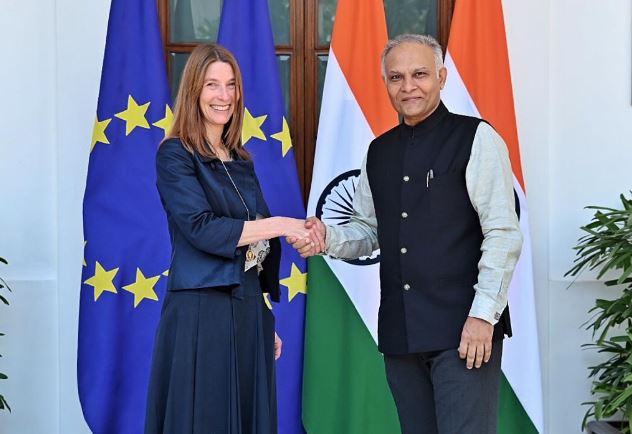New Delhi: India and the European Union took stock of their negotiations for a free trade agreement and an investment protection pact even as they asserted that connectivity projects must respect sovereignty and territorial integrity.
The two sides deliberated on these issues at their fourth strategic partnership review meeting that was held in Delhi Monday.
India and the EU also underscored the need for “comprehensive, just, and lasting” peace in Ukraine in accordance with the United Nations Charter and international law, said a joint statement released Wednesday.
They “unequivocally condemned” terrorism and violent extremism in all its forms and manifestations including cross-border attacks, it said.
The call by India and the EU on the need for respecting sovereignty and territorial integrity of countries in implementing connectivity projects came amid growing global concerns over China’s Belt and Road Initiative (BRI).
India has been severely critical of the BRI as the mega project includes the so-called China-Pakistan Economic Corridor (CPEC). The CPEC that passes through Pakistan-Occupied-Kashmir.
The meeting reviewed the entire gamut of engagement detailed in the ‘India-EU Strategic Partnership: A Roadmap to 2025’.
The discussions focussed on a broad range of topics covering climate, clean energy, biodiversity, circular economy, resource efficiency, trade, mobility, and digital issues, including data protection, the statement said.
“Both sides also discussed cooperation in the sphere of connectivity and emphasised that connectivity projects respect sovereignty and territorial integrity,” it said.
“They also took stock of the ongoing negotiations for free trade agreement, investment protection agreement and agreement on geographical indications and agreed on their importance as well as the need for full cooperation at multilateral level and of a regular bilateral dialogue on economic issues,” it said.
In June last year, India and the EU restarted the negotiations for the long-pending trade and investment agreement after a gap of over eight years.
Launched in June 2007, the negotiations for the proposed agreement have witnessed many hurdles as both sides had major differences on crucial issues.
In the meeting, the two sides also reviewed the progress and scope of the newly launched India-EU Trade and Technology Council (TTC) and looked forward to a successful first ministerial meeting under the mechanism May 16 in Brussels.
The TTC is expected to facilitate exchange of critical technologies relating to an array of domains including artificial intelligence, quantum computing, semiconductors and cybersecurity.
The TTC with India is the European Union’s second such technology partnership after the first one with the United States that was firmed up in June 2021.
“The EU and India talked about the perspectives for a safer, prosperous and more democratic world. They commended the resumption in 2021 of the EU-India Human Rights dialogue, and committed to holding it on an annual basis,” the statement said.
“They also underscored the need for a comprehensive, just, and lasting peace in Ukraine in accordance with the United Nations Charter and international law,” it said.
“Both sides emphasised that the rules-based international order must respect sovereignty, territorial integrity, transparency, and peaceful resolution of disputes,” it added.
India and the EU also expressed commitment to their increased engagement across all areas with a view of identifying areas to strengthen cooperation, including through the Global Gateway, and looking into priorities for the next India-EU summit.
The Global Gateway is an initiative by the EU to fund connectivity projects. The total funding for the project is around 300 billion Euros.
The Indian side at Monday’s meeting was led by Sanjay Verma, Secretary (West) in the Ministry of External Affairs and the EU side was headed by Helena Konig, Deputy Secretary General for Economic and Global Issues at European External Action Service.
PTI
